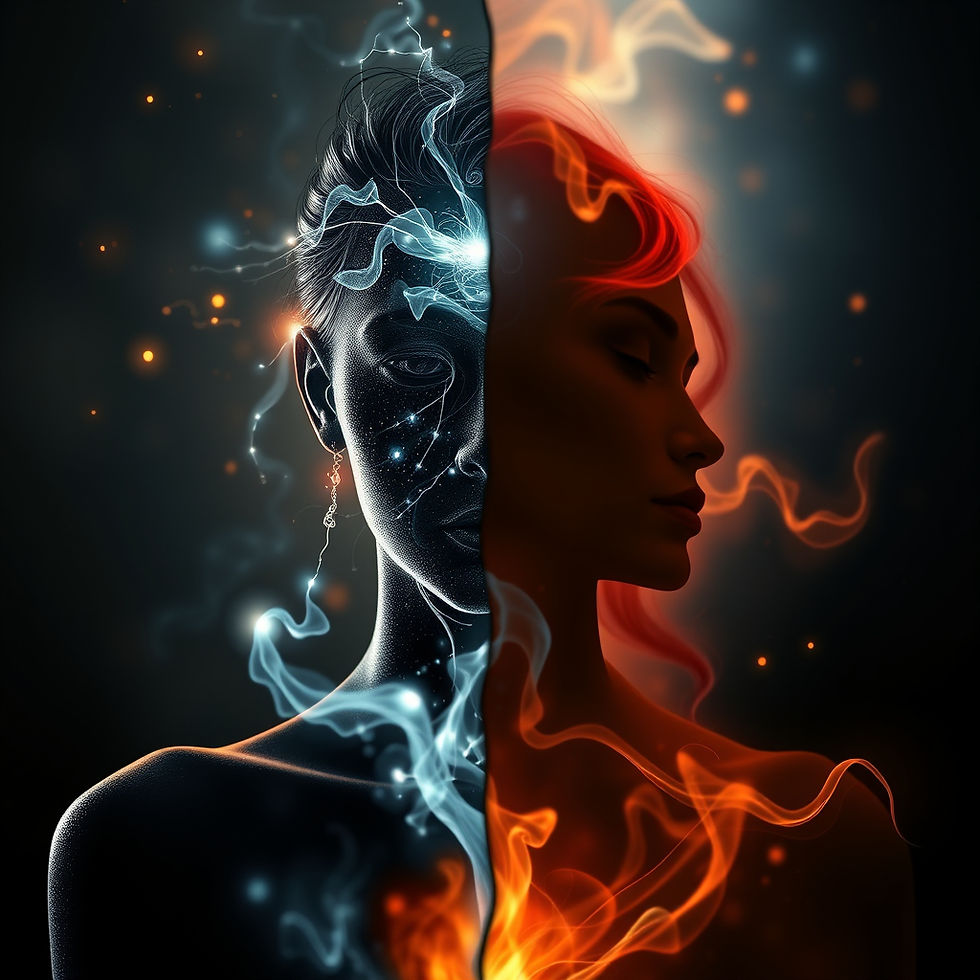What is the human ego and what is its purpose
- Nov 18, 2020
- 4 min read
Updated: May 28, 2024
The idea of the Ego, its role, and how it affects our actions and spiritual growth has been discussed for ages. As we grow up, our families and schools usually shape our ego by teaching us rules and expectations. Later on, our friends and society also play a big part in forming our ego.
A common question people ask is, "What exactly is the human ego?" Here, I'll share my findings, based on my spiritual insights and personal experiences, including my ability to understand souls, body vibes, chakras, and destinies.

What is ego and its spiritual role
Ego, at its core, can be helpful in small doses but harmful if it gets too big.
A soul, full of pure consciousness but lacking energy, takes on a physical form to interact with the world, gain experiences, and boost its awareness. This form isn't just physical; it includes multiple energy layers with complex functions. One of these functions is the ability to hold onto emotional patterns, managed by what we call the subconscious.
The subconscious is a collection of beliefs picked up from various places like family, school, friends, religion, and media. It heavily influences our behavior and choices, often more than our rational thinking. The way this subconscious shows itself, known as the "Ego," shapes our identity, self-view, and how we engage with life and the universe.
Personal space and ego
Our world generally has a low vibration (3D), and a small ego is necessary for survival to protect our Personal Space. Imagine someone demands your stuff or asks you to do something dangerous; a tiny bit of ego helps you say No. Even enlightened souls like Buddha, Jesus, and Krishna needed this basic ego to live and stand up for their beliefs.
But, people often lean towards having a big, aggressive Ego driven by subconscious fears and a desire to grab limited resources. This doesn't mean saying No or standing up for yourself is egoistic; it's about assessing situations and making decisions without judgment.

The original creators of humanity allowed the Ego to exists to help souls experience a variety of conflictual events. The conflicts between human egos were meant to provide valuable lessons for these souls. However, the ego has grown powerful over time, attracting aggressive souls with strong masculine traits from star systems like Orion and Sirius, leading to a history of conflicts and a patriarchal society.
The Ego can also be seen as the collection of our subconscious beliefs, both positive and limiting, that influence our actions and decisions, shaping who we are. For spiritual growth, it is essential to shed our limiting beliefs. When I am looking into someone's body vibration I noticed that persons with higher body vibration have lower egos.
The manifestation of the ego is significantly influenced by the balance of feminine and masculine aspects in an individual. Lately, communities have begun to appreciate more feminine qualities, which is great as long as we focus on the positive aspects and steer clear of the negative ones.
ego and the masculine and feminine aspects
When a society is dominated by negative masculine traits, it often leads to Egos that are bossy, selfish, and divisive, causing conflicts and exploitation. On the flip side, negative feminine traits create an ego that, while less physically violent, thrives on indirect conflict, gossip, and conspiracies.
However, the ego itself isn't inherently bad if managed well. Being assertive and setting personal boundaries are key to our spiritual and physical growth. Unlike what some spiritual traditions and modern gurus like Eckhart Tolle suggest about completely getting rid of the ego for spiritual growth, it's important to find a Balance. The Latin saying "Est modus in rebus!" reminds us that there's a measure in all things.
While there are strong arguments for dissolving the ego to achieve spiritual enlightenment, it's also crucial to recognize that the ego has practical uses in our everyday lives. Instead of aiming to eliminate it entirely, a more balanced approach would be to learn how to manage and control it effectively.
By mastering the ego, we ensure it serves us rather than controls us. The ego can then become a tool for growth, learning, and personal development, helping us interact with the world rather than hindering our spiritual progress.
The ego is vital in forming our identities, shaping how we see ourselves and the world, and influencing our choices and actions. But remember, we're more than just our egos; we also have our souls, spirits, bodies, minds, and hearts.
In our quest for spiritual growth, we should aim to develop a healthy and balanced ego. This means maintaining our individuality, asserting our needs and rights, and making wise decisions without letting the ego become overly dominant, aggressive, or selfish, which can lead to conflict and suffering.
So, the key to dealing with the ego isn't to eradicate it but to master it. By finding this balance, we can truly use the ego as a tool for personal and spiritual growth.
Conclusion
If we truly understand and manage our ego, it can be a great asset for personal growth and spiritual development. Instead of trying to get rid of it completely, let's aim to understand, master, and use it wisely.
Like with everything, balance and moderation are key.
...................................
You can learn more by reading other posts in this spiritual site that are coming from a very different and fresh angle than spiritual mainstream, and based on a very long and personal experience and hands-on research, and not from books.
You might also consider a service like Psychic Readings in the Services section of this site from the ones listed here and get a spiritual diagnostic, or attend my spiritual School of Body and Soul Ascension Mastery so to raise your body and soul awareness and reach into higher dimensions.





Comments